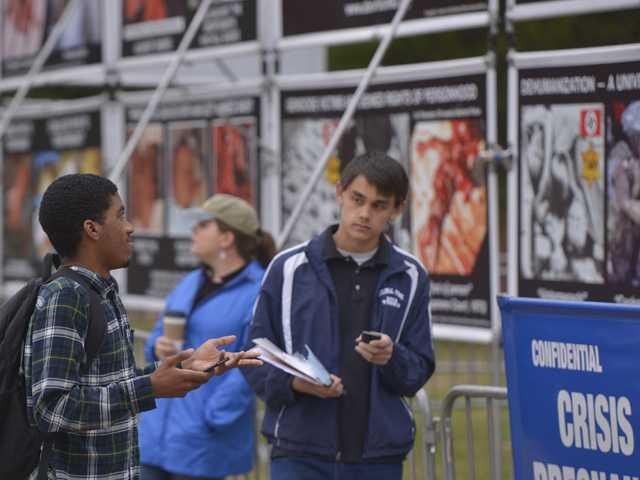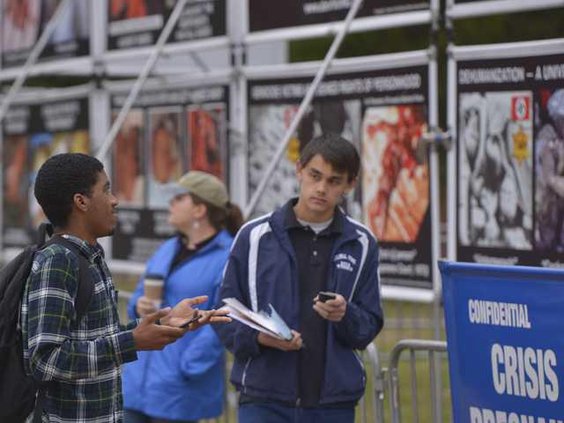Photographs have the power to make us smile, laugh and remember the times of our lives. They also have the power to challenge our assertions and confront our worst fears. And, sometimes, they have the power to offend our sensibilities and taste.
The Center for Bio-Ethical Reform, an anti-abortion advocacy group based in California, asserted its First Amendment right to free speech and tested the sensibilities of Statesboro and Georgia Southern University with its Genocide Awareness Project Thursday and Friday.
The project features graphic photographs of aborted human fetuses and juxtaposes them with imagery of genocide, including the Holocaust. The center hopes to confront the public and engage people in discussion with the attention the images bring.
According to Lincoln Brandenburg, the center's Georgia project director, the organization's principles are inspired by Dr. Martin Luther King Jr. in his efforts to bring to light the injustices of racism.
Referencing imagery and photographs that depict the funerals of slain civil rights advocates, Brandenburg sees their mission as "opening the casket on abortion." The photos "catch a lot of eyes because, maybe, they've never seen an abortion," he said.
On Wednesday, the Statesboro Police Department issued a news release, after being contacted by the center, to announce the presence of the project and that the group was within its Constitutional rights to display the images. The center's standard operating procedure is to contact, in advance, the local police anywhere it plans to put the images on display.
Cpl. Justin Samples, the police department's public information officer, said displaying the photos is protected by law, and notification was not required.
"We appreciated being notified first, however, so we could notify the public and our officers in case they had to address phone calls," he said in an interview.
Georgia Southern University is one of eight colleges the Genocide Awareness Project will visit in four weeks. Jan Bond, the university's associate vice president of marketing and communications, said: "As an institution of higher education, Georgia Southern University encourages open and constructive dialogue. As a public university, we are committed to respecting the First Amendment rights of all individuals, regardless of viewpoint. The University maintains a policy regarding speech on campus and requires that its provisions are followed to foster a safe environment for individuals to exercise these rights."

Sam Mastriforte, 20, and Ashley Vales, 18, both of Canton, stopped and engaged in conversation with Jackie Hawkins of the center. Even though Vales disagrees with the center's position, she feels abortion is a legitimate issue.
"Public discussion forces people to think and decide," Vales said.
Mastriforte didn't appreciate the use of Nazi symbols or pictures of Holocaust victims. He said it was overly dramatic and sensationalist.
Neither had a change of heart because of the display or the conversation.
Hawkins, of Newport News, Virginia, is new to the advocacy group and was nervous about engaging the public. What struck her in her exchanges?
"Southern hospitality," she said. "Some were irritated since we have answers for everything, but they were still very polite."
Shock value was a common theme in reactions.
"Graphic as hell!" said student Cris Gullatt, 20, of Douglasville. He said he is not offended by the shock value of the photographs, but he was looking for more facts, not sentiment.
Student Justin Braddy, 22, of Soperton, who said he opposes abortion, said: "I think it's very bold. It's (the display) the reality of things, in my opinion. How do we know the reality of what happened in Vietnam or Iraq? We need to know what it looks like. Photos are reality."
Student Myderra Jones, 20, of Hinesville, said she opposes abortion but did not approve of the linking of abortion to genocide. Friend and fellow student Lani Hodge, 20, of Atlanta, supports abortion rights but agreed with Jones on the genocide argument.
"They're appealing to ignorant people," Hodge said. "Plus, they're citing old sources of information from the 1950s to the 1980s."
Student David Dodd, 25, of Statesboro, said he found the display tasteless, particularly the comparisons of abortion to the Holocaust and other genocides. He said pictures of heart surgery, for instance, are equally graphic and might scare some people. He believes shock value can get people to ask questions.
"Once you get past the shock value, though, the argument is not there to support their position," Dodd said.
Responding to the reactions about equating abortion to genocide, Brandenburg said the correlation is "inappropriate only if the unborn child isn't a human being."
Brandenburg claimed that at least three people during the group's visit to Georgia Southern changed their stance on abortion after viewing the pictures and having discussions. He is undeterred by a lack of instant conversions.
"The power of the images is that they plant a seed, that they remember what they saw," he said.
He admits that discussions can get heated, but the group still tries to treat everyone with respect.
"Rather than be angry, people should ask if the pictures are true," Brandenburg said.
Signs around the display state that the pictures are real, not retouched, and offer a chance to confirm their authenticity. Brandenburg said the photographs are from a medical school textbook and that the group has statements from a photographer and a doctor who verify the authenticity of the photos.
Brandenburg encourages people to do further research for themselves if they are skeptical.
When asked about parents who don't want their children to see such graphic images, Brandenburg said: "Human lives are more important than human feelings. If parents are calm about the pictures, the children will be calm. A child knows that's a baby (in the pictures)."
Sultan al Hudaiyan, 21, a student from Saudi Arabia, had a different take on the display. He was drawn to the pictures, but he felt their statement was unclear - even after reading the accompanying text. Al Hudaiyan thinks abortion is mainly an American issue.
"Americans should be focusing on other issues, not abortions," he said.
The debate on abortion is likely to carry on for a long time to come. But what's hardly debatable is that photographs have the power to generate discussion.
Said Braddy, the student from Soperton who opposes abortion: "I think that's what they need to do on college campuses - have discussion."




